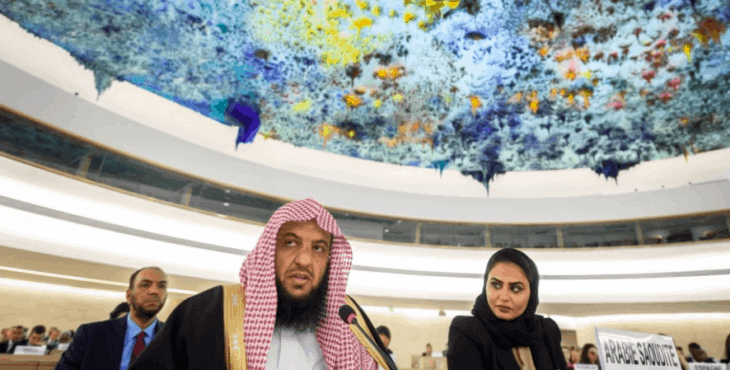On Tuesday, 15 countries were elected to the United Nations Human Rights Council (UNHRC) for three-year terms beginning in January. While China, Russia, Pakistan, and Cuba were amongst those who were voted into the 47-member body, Saudi Arabia failed to garner enough support for its membership attempt.
I congratulate:
— UN GA President (@UN_PGA) October 13, 2020
Côte d’Ivoire 🇨🇮
Gabon 🇬🇦
Malawi 🇲🇼
Senegal 🇸🇳
China 🇨🇳
Nepal 🇳🇵
Pakistan 🇵🇰
Uzbekistan 🇺🇿
Russia 🇷🇺
Ukraine 🇺🇦
Bolivia 🇧🇴
Cuba 🇨🇺
Mexico 🇲🇽
France 🇫🇷
United Kingdom 🇬🇧
For your election as members of the @UN Human Rights Council
According to UN Resolution 60/251, the document that lays down the rules for the Council, member states are directly elected by secret ballot voting by a majority in the UN General Assembly. It further states that member states elected to the UNHRC must pledge to follow the highest standards to protect and promote human rights. A crucial yet controversial feature of UNHRC membership is that seats are allotted and distributed according to geographically demarcated groupings. So, while Cuba and Russia ran and won unopposed, China and Saudi Arabia, along with Pakistan, Nepal, and Uzbekistan, were pitted against one another in a five-nation race for four coveted Asia-Pacific spots in the Council. Riyadh only managed to garner 90 votes, while Islamabad secured the most support with 169 votes.
Saudi Arabia’s bid for a seat in the Council has been questioned by critics all over the world. The country’s massive round-up of hundreds of political dissidents, detention of dozens of women’s rights activists, and mass prisoner executions have raised global alarm over the years. This was exacerbated by the widely-followed investigation into the killing of journalist Jamal Khashoggi in Istanbul, which has been linked to Crown Prince Mohammed bin Salman. Political parties, public protests, and labor unions are also banned in Saudi Arabia.
In fact, global watchdog Human Rights Watch (HRW) has clubbed Beijing with Riyadh as “two of the world’s most abusive governments”, citing Beijing’s detention and brutal treatment of Uighur Muslims and general intolerance for political dissent. Just before the vote, the United Kingdom’s shadow foreign secretary Lisa Nandy had written a letter to foreign secretary Dominic Raab saying, “The UK must publicly oppose China’s re-election to the UN Human Rights Council and show that our support for the Uighur people goes beyond warm words and empty rhetoric.” Russia’s membership, too, has been opposed by HRW due to its war crimes in Syria and Crimea.
Several experts have opined that the induction of countries with questionable human rights records to the Council highlights the need for serious reforms to the body’s voting system. Kevin Jon Heller, an international law professor at the University of Copenhagen, has attributed this to “messy bureaucracy” at the UN. “There is simply no way to avoid the kinds of backroom deals that result in outcomes like this. There is simply no evidence that countries take human rights records into account when they vote,” he said.
Hillel Neuer, Executive Director of UN Watch, has called for the UN to end the practice of elections to the HRC altogether and instead open it up to all of its 193 members. “We have to consider scrapping the entire election process,” he said, “the elections have no effect other than a negative effect of allowing those countries to parade themselves around the world as elected members – and it does not have the desired effect of keeping them off [...] Electing these dictatorships as UN judges on human rights is like making a gang of arsonists into the fire brigade.”
Today is a black day for human rights—U.N.’s newest world judges on human rights include:
— Hillel Neuer (@HillelNeuer) October 13, 2020
🇵🇰 Pakistan - persecutes Christians, Hindu, Ahmadis
🇨🇳 China - herded 1 million Uighurs into camps
🇷🇺 Russia - poisons dissidents
🇨🇺 Cuba - police state
The inmates are running the asylum. pic.twitter.com/O9ePHirNES
Agnes Callamard, the UN’s Special Rapporteur for Extrajudicial, Summary, or Arbitrary Executions, who investigated the Khashoggi murder, said that the election of states like Russia and China “damages the reputation of the HRC, its standing within the international human rights committee and beyond [...] What it will do is strengthen the views of those who reject multilateralism, the UN, and the global project.”
Further, Louis Charbonneau, the HRW’s UN director, said that Riyadh’s failure to win a seat on the Council is a “welcome reminder” for the need for more competition in the UN’s electoral process. He added that additional candidates might have prevented Cuba, Russia, and China from getting elected. Previously, Charbonneau has criticized Western members of the UN for not wanting competitions and perpetuating a system of backroom deals that are worked out internally among regional groupings. “But the addition of these undeserving countries won’t prevent the council from shining a light on abuses and speaking up for victims,” he said, “In fact, by being on the council, these abusers will be directly in the spotlight.’’

